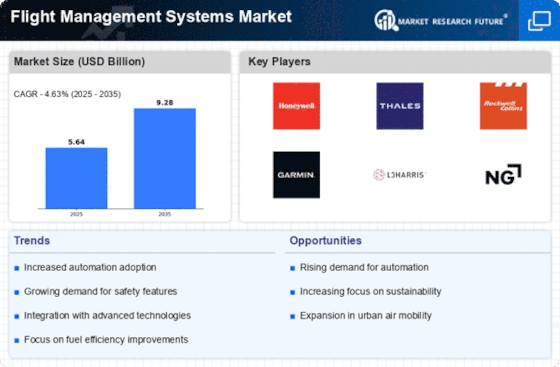Commercial Aviation
Military Aviation
General Aviation
Cargo Aviation
Autonomous Flight Management Systems
Assisted Flight Management Systems
Hybrid Flight Management Systems
Software
Hardware
Integrated Systems
Airlines
Cargo Operators
Private Operators
Military Air Forces
North America
Europe
South America
Asia Pacific
Middle East and Africa
North America Outlook (USD Billion, 2019-2032)
Flight Management Systems Market by Application Type
Commercial Aviation
Military Aviation
General Aviation
Cargo Aviation
Flight Management Systems Market by System Type
Autonomous Flight Management Systems
Assisted Flight Management Systems
Hybrid Flight Management Systems
Flight Management Systems Market by Component Type
Software
Hardware
Integrated Systems
Flight Management Systems Market by End Use Type
Airlines
Cargo Operators
Private Operators
Military Air Forces
Flight Management Systems Market by Regional Type
US
Canada
US Outlook (USD Billion, 2019-2032)
Flight Management Systems Market by Application Type
Commercial Aviation
Military Aviation
General Aviation
Cargo Aviation
Flight Management Systems Market by System Type
Autonomous Flight Management Systems
Assisted Flight Management Systems
Hybrid Flight Management Systems
Flight Management Systems Market by Component Type
Software
Hardware
Integrated Systems
Flight Management Systems Market by End Use Type
Airlines
Cargo Operators
Private Operators
Military Air Forces
CANADA Outlook (USD Billion, 2019-2032)
Flight Management Systems Market by Application Type
Commercial Aviation
Military Aviation
General Aviation
Cargo Aviation
Flight Management Systems Market by System Type
Autonomous Flight Management Systems
Assisted Flight Management Systems
Hybrid Flight Management Systems
Flight Management Systems Market by Component Type
Software
Hardware
Integrated Systems
Flight Management Systems Market by End Use Type
Airlines
Cargo Operators
Private Operators
Military Air Forces
Europe Outlook (USD Billion, 2019-2032)
Flight Management Systems Market by Application Type
Commercial Aviation
Military Aviation
General Aviation
Cargo Aviation
Flight Management Systems Market by System Type
Autonomous Flight Management Systems
Assisted Flight Management Systems
Hybrid Flight Management Systems
Flight Management Systems Market by Component Type
Software
Hardware
Integrated Systems
Flight Management Systems Market by End Use Type
Airlines
Cargo Operators
Private Operators
Military Air Forces
Flight Management Systems Market by Regional Type
Germany
UK
France
Russia
Italy
Spain
Rest of Europe
GERMANY Outlook (USD Billion, 2019-2032)
Flight Management Systems Market by Application Type
Commercial Aviation
Military Aviation
General Aviation
Cargo Aviation
Flight Management Systems Market by System Type
Autonomous Flight Management Systems
Assisted Flight Management Systems
Hybrid Flight Management Systems
Flight Management Systems Market by Component Type
Software
Hardware
Integrated Systems
Flight Management Systems Market by End Use Type
Airlines
Cargo Operators
Private Operators
Military Air Forces
UK Outlook (USD Billion, 2019-2032)
Flight Management Systems Market by Application Type
Commercial Aviation
Military Aviation
General Aviation
Cargo Aviation
Flight Management Systems Market by System Type
Autonomous Flight Management Systems
Assisted Flight Management Systems
Hybrid Flight Management Systems
Flight Management Systems Market by Component Type
Software
Hardware
Integrated Systems
Flight Management Systems Market by End Use Type
Airlines
Cargo Operators
Private Operators
Military Air Forces
FRANCE Outlook (USD Billion, 2019-2032)
Flight Management Systems Market by Application Type
Commercial Aviation
Military Aviation
General Aviation
Cargo Aviation
Flight Management Systems Market by System Type
Autonomous Flight Management Systems
Assisted Flight Management Systems
Hybrid Flight Management Systems
Flight Management Systems Market by Component Type
Software
Hardware
Integrated Systems
Flight Management Systems Market by End Use Type
Airlines
Cargo Operators
Private Operators
Military Air Forces
RUSSIA Outlook (USD Billion, 2019-2032)
Flight Management Systems Market by Application Type
Commercial Aviation
Military Aviation
General Aviation
Cargo Aviation
Flight Management Systems Market by System Type
Autonomous Flight Management Systems
Assisted Flight Management Systems
Hybrid Flight Management Systems
Flight Management Systems Market by Component Type
Software
Hardware
Integrated Systems
Flight Management Systems Market by End Use Type
Airlines
Cargo Operators
Private Operators
Military Air Forces
ITALY Outlook (USD Billion, 2019-2032)
Flight Management Systems Market by Application Type
Commercial Aviation
Military Aviation
General Aviation
Cargo Aviation
Flight Management Systems Market by System Type
Autonomous Flight Management Systems
Assisted Flight Management Systems
Hybrid Flight Management Systems
Flight Management Systems Market by Component Type
Software
Hardware
Integrated Systems
Flight Management Systems Market by End Use Type
Airlines
Cargo Operators
Private Operators
Military Air Forces
SPAIN Outlook (USD Billion, 2019-2032)
Flight Management Systems Market by Application Type
Commercial Aviation
Military Aviation
General Aviation
Cargo Aviation
Flight Management Systems Market by System Type
Autonomous Flight Management Systems
Assisted Flight Management Systems
Hybrid Flight Management Systems
Flight Management Systems Market by Component Type
Software
Hardware
Integrated Systems
Flight Management Systems Market by End Use Type
Airlines
Cargo Operators
Private Operators
Military Air Forces
REST OF EUROPE Outlook (USD Billion, 2019-2032)
Flight Management Systems Market by Application Type
Commercial Aviation
Military Aviation
General Aviation
Cargo Aviation
Flight Management Systems Market by System Type
Autonomous Flight Management Systems
Assisted Flight Management Systems
Hybrid Flight Management Systems
Flight Management Systems Market by Component Type
Software
Hardware
Integrated Systems
Flight Management Systems Market by End Use Type
Airlines
Cargo Operators
Private Operators
Military Air Forces
APAC Outlook (USD Billion, 2019-2032)
Flight Management Systems Market by Application Type
Commercial Aviation
Military Aviation
General Aviation
Cargo Aviation
Flight Management Systems Market by System Type
Autonomous Flight Management Systems
Assisted Flight Management Systems
Hybrid Flight Management Systems
Flight Management Systems Market by Component Type
Software
Hardware
Integrated Systems
Flight Management Systems Market by End Use Type
Airlines
Cargo Operators
Private Operators
Military Air Forces
Flight Management Systems Market by Regional Type
China
India
Japan
South Korea
Malaysia
Thailand
Indonesia
Rest of APAC
CHINA Outlook (USD Billion, 2019-2032)
Flight Management Systems Market by Application Type
Commercial Aviation
Military Aviation
General Aviation
Cargo Aviation
Flight Management Systems Market by System Type
Autonomous Flight Management Systems
Assisted Flight Management Systems
Hybrid Flight Management Systems
Flight Management Systems Market by Component Type
Software
Hardware
Integrated Systems
Flight Management Systems Market by End Use Type
Airlines
Cargo Operators
Private Operators
Military Air Forces
INDIA Outlook (USD Billion, 2019-2032)
Flight Management Systems Market by Application Type
Commercial Aviation
Military Aviation
General Aviation
Cargo Aviation
Flight Management Systems Market by System Type
Autonomous Flight Management Systems
Assisted Flight Management Systems
Hybrid Flight Management Systems
Flight Management Systems Market by Component Type
Software
Hardware
Integrated Systems
Flight Management Systems Market by End Use Type
Airlines
Cargo Operators
Private Operators
Military Air Forces
JAPAN Outlook (USD Billion, 2019-2032)
Flight Management Systems Market by Application Type
Commercial Aviation
Military Aviation
General Aviation
Cargo Aviation
Flight Management Systems Market by System Type
Autonomous Flight Management Systems
Assisted Flight Management Systems
Hybrid Flight Management Systems
Flight Management Systems Market by Component Type
Software
Hardware
Integrated Systems
Flight Management Systems Market by End Use Type
Airlines
Cargo Operators
Private Operators
Military Air Forces
SOUTH KOREA Outlook (USD Billion, 2019-2032)
Flight Management Systems Market by Application Type
Commercial Aviation
Military Aviation
General Aviation
Cargo Aviation
Flight Management Systems Market by System Type
Autonomous Flight Management Systems
Assisted Flight Management Systems
Hybrid Flight Management Systems
Flight Management Systems Market by Component Type
Software
Hardware
Integrated Systems
Flight Management Systems Market by End Use Type
Airlines
Cargo Operators
Private Operators
Military Air Forces
MALAYSIA Outlook (USD Billion, 2019-2032)
Flight Management Systems Market by Application Type
Commercial Aviation
Military Aviation
General Aviation
Cargo Aviation
Flight Management Systems Market by System Type
Autonomous Flight Management Systems
Assisted Flight Management Systems
Hybrid Flight Management Systems
Flight Management Systems Market by Component Type
Software
Hardware
Integrated Systems
Flight Management Systems Market by End Use Type
Airlines
Cargo Operators
Private Operators
Military Air Forces
THAILAND Outlook (USD Billion, 2019-2032)
Flight Management Systems Market by Application Type
Commercial Aviation
Military Aviation
General Aviation
Cargo Aviation
Flight Management Systems Market by System Type
Autonomous Flight Management Systems
Assisted Flight Management Systems
Hybrid Flight Management Systems
Flight Management Systems Market by Component Type
Software
Hardware
Integrated Systems
Flight Management Systems Market by End Use Type
Airlines
Cargo Operators
Private Operators
Military Air Forces
INDONESIA Outlook (USD Billion, 2019-2032)
Flight Management Systems Market by Application Type
Commercial Aviation
Military Aviation
General Aviation
Cargo Aviation
Flight Management Systems Market by System Type
Autonomous Flight Management Systems
Assisted Flight Management Systems
Hybrid Flight Management Systems
Flight Management Systems Market by Component Type
Software
Hardware
Integrated Systems
Flight Management Systems Market by End Use Type
Airlines
Cargo Operators
Private Operators
Military Air Forces
REST OF APAC Outlook (USD Billion, 2019-2032)
Flight Management Systems Market by Application Type
Commercial Aviation
Military Aviation
General Aviation
Cargo Aviation
Flight Management Systems Market by System Type
Autonomous Flight Management Systems
Assisted Flight Management Systems
Hybrid Flight Management Systems
Flight Management Systems Market by Component Type
Software
Hardware
Integrated Systems
Flight Management Systems Market by End Use Type
Airlines
Cargo Operators
Private Operators
Military Air Forces
South America Outlook (USD Billion, 2019-2032)
Flight Management Systems Market by Application Type
Commercial Aviation
Military Aviation
General Aviation
Cargo Aviation
Flight Management Systems Market by System Type
Autonomous Flight Management Systems
Assisted Flight Management Systems
Hybrid Flight Management Systems
Flight Management Systems Market by Component Type
Software
Hardware
Integrated Systems
Flight Management Systems Market by End Use Type
Airlines
Cargo Operators
Private Operators
Military Air Forces
Flight Management Systems Market by Regional Type
Brazil
Mexico
Argentina
Rest of South America
BRAZIL Outlook (USD Billion, 2019-2032)
Flight Management Systems Market by Application Type
Commercial Aviation
Military Aviation
General Aviation
Cargo Aviation
Flight Management Systems Market by System Type
Autonomous Flight Management Systems
Assisted Flight Management Systems
Hybrid Flight Management Systems
Flight Management Systems Market by Component Type
Software
Hardware
Integrated Systems
Flight Management Systems Market by End Use Type
Airlines
Cargo Operators
Private Operators
Military Air Forces
MEXICO Outlook (USD Billion, 2019-2032)
Flight Management Systems Market by Application Type
Commercial Aviation
Military Aviation
General Aviation
Cargo Aviation
Flight Management Systems Market by System Type
Autonomous Flight Management Systems
Assisted Flight Management Systems
Hybrid Flight Management Systems
Flight Management Systems Market by Component Type
Software
Hardware
Integrated Systems
Flight Management Systems Market by End Use Type
Airlines
Cargo Operators
Private Operators
Military Air Forces
ARGENTINA Outlook (USD Billion, 2019-2032)
Flight Management Systems Market by Application Type
Commercial Aviation
Military Aviation
General Aviation
Cargo Aviation
Flight Management Systems Market by System Type
Autonomous Flight Management Systems
Assisted Flight Management Systems
Hybrid Flight Management Systems
Flight Management Systems Market by Component Type
Software
Hardware
Integrated Systems
Flight Management Systems Market by End Use Type
Airlines
Cargo Operators
Private Operators
Military Air Forces
REST OF SOUTH AMERICA Outlook (USD Billion, 2019-2032)
Flight Management Systems Market by Application Type
Commercial Aviation
Military Aviation
General Aviation
Cargo Aviation
Flight Management Systems Market by System Type
Autonomous Flight Management Systems
Assisted Flight Management Systems
Hybrid Flight Management Systems
Flight Management Systems Market by Component Type
Software
Hardware
Integrated Systems
Flight Management Systems Market by End Use Type
Airlines
Cargo Operators
Private Operators
Military Air Forces
MEA Outlook (USD Billion, 2019-2032)
Flight Management Systems Market by Application Type
Commercial Aviation
Military Aviation
General Aviation
Cargo Aviation
Flight Management Systems Market by System Type
Autonomous Flight Management Systems
Assisted Flight Management Systems
Hybrid Flight Management Systems
Flight Management Systems Market by Component Type
Software
Hardware
Integrated Systems
Flight Management Systems Market by End Use Type
Airlines
Cargo Operators
Private Operators
Military Air Forces
Flight Management Systems Market by Regional Type
GCC Countries
South Africa
Rest of MEA
GCC COUNTRIES Outlook (USD Billion, 2019-2032)
Flight Management Systems Market by Application Type
Commercial Aviation
Military Aviation
General Aviation
Cargo Aviation
Flight Management Systems Market by System Type
Autonomous Flight Management Systems
Assisted Flight Management Systems
Hybrid Flight Management Systems
Flight Management Systems Market by Component Type
Software
Hardware
Integrated Systems
Flight Management Systems Market by End Use Type
Airlines
Cargo Operators
Private Operators
Military Air Forces
SOUTH AFRICA Outlook (USD Billion, 2019-2032)
Flight Management Systems Market by Application Type
Commercial Aviation
Military Aviation
General Aviation
Cargo Aviation
Flight Management Systems Market by System Type
Autonomous Flight Management Systems
Assisted Flight Management Systems
Hybrid Flight Management Systems
Flight Management Systems Market by Component Type
Software
Hardware
Integrated Systems
Flight Management Systems Market by End Use Type
Airlines
Cargo Operators
Private Operators
Military Air Forces
REST OF MEA Outlook (USD Billion, 2019-2032)
Flight Management Systems Market by Application Type
Commercial Aviation
Military Aviation
General Aviation
Cargo Aviation
Flight Management Systems Market by System Type
Autonomous Flight Management Systems
Assisted Flight Management Systems
Hybrid Flight Management Systems
Flight Management Systems Market by Component Type
Software
Hardware
Integrated Systems
Flight Management Systems Market by End Use Type
Airlines
Cargo Operators
Private Operators
Military Air Forces



















Leave a Comment